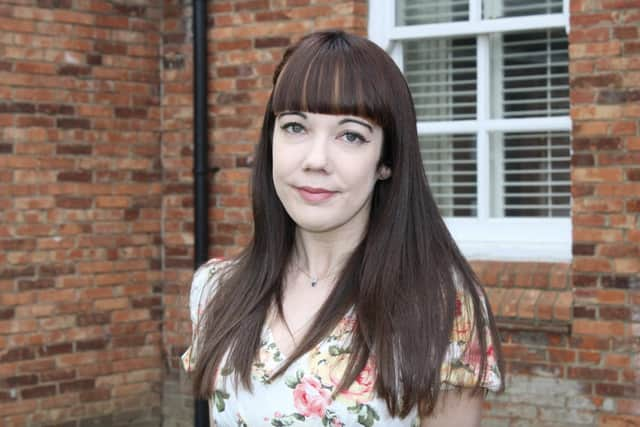Author tackles prejudice against Scots language in schools in new ‘coming of age’ novel
Emma Grae, one of the rising stars of Scotland’s literary scene, hopes The Tongue She Speak will ask "serious questions" about the neglect of the Scots language in the country’s education system and its "bias" in favour of English.
The 29-year-old wants to see Higher Scots offered as part of Scotland’s school curriculum for the first time.
Advertisement
Hide AdAdvertisement
Hide AdGlasgow-based Grae's book charts the experiences of 15-year-old Cathy O'Kelly, who harbours ambitions of becoming a writer in the Scots language, but suffers bullying after being targeted by an aspiring poet. The Clydebank writer’s new book, which explores teenage life, mental health and abusive relationships, as well as the treatment of generations of Scots speakers, has been hailed by Grae’s publisher Luath as “a vital take on growing up and coming of age in modern Scotland.”


Grae has drawn inspiration from her experiences working in a care home in Glasgow for her debut.
Follow-up The Tongue She Speaks, which is set in 2007, is partly inspired by her own teenage years growing up in Clydebank and her experiences of school.
Grae said: “Like Cathy, I also had the experience of going to a school outside my catchment area, and there were fewer Scots speakers at my high school than the primary I’d attended.
“It was the first time that I realised my language set me apart from other people and, unfortunately, because I was aware that I was different, like most young people, I tried to change my voice to fit in. An act that was encouraged by my mum and granny at the time, who were very much of the opinion that if I couldn’t speak properly, I wouldn’t be able to spell properly.


“I had been writing the character of Cathy O’Kelly, a shy, socially-awkward woman since 2016, who tires and fails to carve out a place for herself as an adult in Glasgow like I did. She was like me career wise, but a lot shyer in just about every other area.
“She has various struggles with confidence and mental health issues, and I think we need more honest representation of the latter in fiction.
Advertisement
Hide AdAdvertisement
Hide Ad“I was writing her adult story in Scots at the time, but I’d never really thought about what she might have been like as a teenager until the pandemic.
“During it, the Scots Language Centre commissioned me and a group of other writers to create a work that would encourage Scots literacy, and that’s when I decided to give her my experience of a desire to write, but did so in Scots so that I could explore the trials and tribulations that come with creating in the lied.
“I know exactly what’s going to happen to Cathy, up until her late 20s too, and my next book will be a continuation of her story – Cathy, get yer Dancin Shoes Oan.”
Grae is part of a generation of writers and performers who have come to prominence in recent years thanks to their championing of the Scots language on social media, including Iona Fyfe, Alistair Heather and Len Pennie.
She said: “I didn’t really connect with any other Scots writers until after Be Guid tae yer Mammy had been accepted for publication by Unbound in 2019. Prior to that, I very much was operating in a bubble – and not even using Scots all that well when it came to spellings.
“There’s been a real resurgence since 2020, but prior to that, I very much felt like I was the only person in the world who was doing it, at least when it came to prose. It was amazing to see that I wasn’t alone during the pandemic.
“When I was at school and at university in Scotland, I had basically no exposure to Scots, even during a literature degree. If it hadn’t been for those chance ideas and drinks with Lorna, I might have never been exposed to it.
Advertisement
Hide AdAdvertisement
Hide Ad“It makes me really sad too as if I had been educated about Scots, I wouldn’t have felt the shame that I felt for speaking almost exclusively in the language as a child.
“Although I’m kicking 30 now, and I know things have improved since I was in education.”
The Tongue She Speaks has been released weeks after Grae was recognised at the Scots Language Awards in Dundee, when her debut novel “Be guid tae yer Mammy,” was named Scots Book of the Year.
She said: “While the SQA have now implemented Scots Language qualifications and do allow for coursework in Scots, I would love to see the option for a Higher Scots as I think it would encourage people to engage with literacy more generally if they had the chance to do so in, what is for many, their first language.
“Formal qualifications like Higher fundamentally give people more opportunities, and it’s sad that right now English is the only option.
“There’s an opportunity here to potentially increase general attainment rates and I think it should be taken.
“Someone said to me the other week that they don’t like reading English books, but they love Scots books. Why shouldn’t they be allowed to get a language qualification too?
Advertisement
Hide AdAdvertisement
Hide Ad“I think also there needs to be a greater education about the history of the Scots language, whether it’s in history classes or part of a more general Scots studies course.
“The Scots language also needs legal protection because, as it stands, the classism around it today is almost certainly going to put people off even putting pen to paper.”
Comments
Want to join the conversation? Please or to comment on this article.
